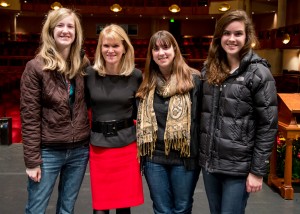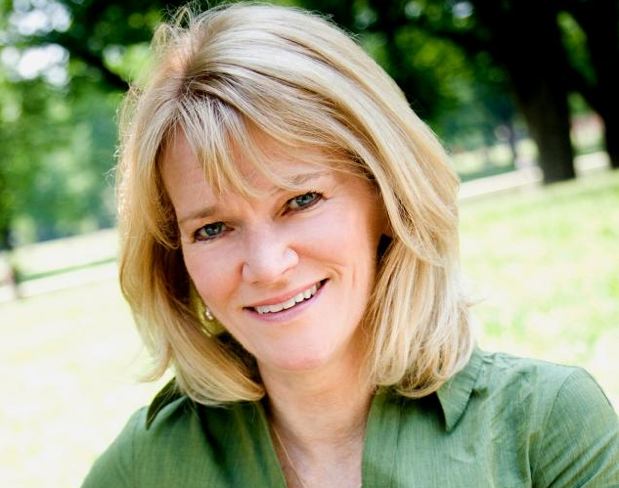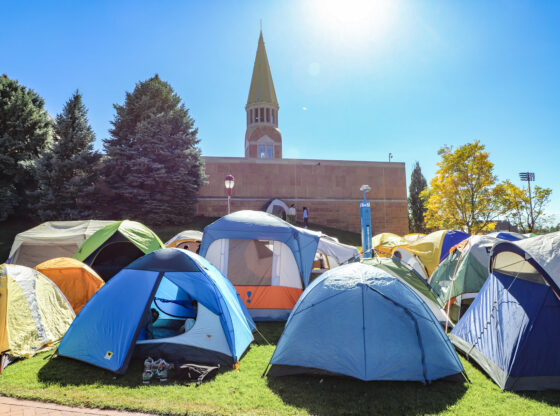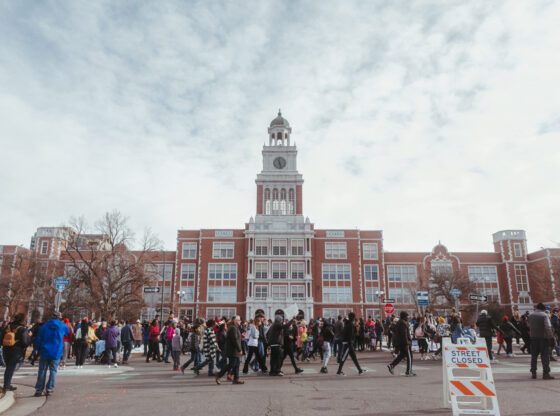
The Clarion had the chance to sit down with ABC’s Senior Foreign Affairs Correspondent, Martha Raddatz for a short interview last Monday evening after she gave a speech at Lamont regarding her more than thirty-year career in journalism and foreign affairs. Raddatz is well known for her time spent reporting on the war in Iraq, her book “The Long Road Home,” published in 2007, as well as her position as moderator for the Vice Presidential debate last October. As follows, are the questions we asked and her responses:
What is the biggest issue that you think college students should be educated on? What should we be concerned about in terms of international news?
I think if you haven’t traveled, and obviously most college kids haven’t, then seeing how America is perceived is sometimes different than you would think. I think Americans tend to think, and your generation not as much as mine, that everybody just loves us and I think that is not always the case. Some of [these stereotypes] are not real. Some of it is rumors, but some of it is real. Think about trying to change the world [and] about how America is viewed. I think theres’ a lot of repair to do.
What do you think we can do with that? What can we do to change that perception?
I don’t know, I guess it’s probably what we, as a nation, haven’t figured out… We send groups overseas, we send singers. I think all that helps – I think sports help, and cultural outreach. Our reporter in Iran the other day, David Muir – I was sort of stunned, I didn’t even realize this- but [he reported] there was a wrestling match between the US and Iran. So that kind of outreach was still going on. But I think that’s all from knowing people. If they know you or they know Americans in a different light, I think that’s important.
Around 65 percent of our students study abroad so it’s definitely something that is important for them to know.
It is, and it’s important to keep up exchanges. It doesn’t always work, we’ve trained a lot of troops that go right back and shoot us.
Do you have any advice for aspiring journalists?
Find something you really love. Whether that’s foreign affairs, whether that’s city beat, whether it’s whatever and learn it.[Thinks for a bit] Here’s my better advice: learn how to be a reporter, because I see a lot of people coming through and a lot of people have no idea how to be a reporter. And it’s so easy, Google children, that you can look up everything. I started really at the bottom of the ladder I think that’s important.
Unless you are a brilliant writer and that’s what you want to do, or you’re a brilliant foreign policy mind and you’re going to bring that…but [it is important] to fundamentally know how to pick up the phone and say “What? Why did you guys do that today?” or “Who’s working on that case?”
When I started covering the military, I knew nothing about the military, but I had a completely open mind about it and I wanted to learn everything about it and I had a fundamental respect.
On the other end of the spectrum, students wishing to get a little bit more involved in foreign policy, what are some simple steps that they could take to start that?
I think I would go to the State Department website, and the CIA website. [Laughing] I’m going to get slapped for that, but you know there are analyst jobs that are fascinating and I know a lot of young people who have ended up at the agency. You’re not a secret spy, you’re an analyst.
I would actually-and this will sound insane to you guys probably-look at intelligence jobs in the military as another option, or a lawyer in the military. There are all kinds of jobs within the military that people don’t know exist. You’re an intelligence officer. A lot of women have done that over the years because of the combat exclusion. A friend of mine named Matt Sherman went into the state department. You take a foreign service exam, and you end up posted in embassies around the world.
What about students that don’t necessarily want to get involved in a career, but just want to be more involved in being an active member of their country?
Knowing the world? Then I would go to major news sources – [such as] the New York Times, Washington Post, Wall Street Journal and National Public Radio. We [ABC] are too, but not to the extent that they are. So I would read that, and click on Foreign News and click on the world.
There’s also a website called GlobalPost which has a lot of young people around the world [writing] for them. One girl [who I taught at Wesleyan] is interested in foreign news coverage and is writing for GlobalPost now, just a few dispatches, but that’s the way you start.
When I was your age I had no idea there were a million perspectives, so, I was really quite clueless. I still think there’s hope for my son.
I think a lot of people our age don’t really take a global look at things. What do you think?
Look at our budget, look where your tax dollars are going. For foreign aid, for the military, for all those things…you should know about this stuff. The military, by the way, is absolutely fascinating. It is the greatest beat in the world. I started covering it in ’93. It is social issues. It is cultural issues, it is war, it is life, it is death, it is all those amazing things that get you passionate about anything. I mean I never planned on becoming a war correspondent. A war broke out, but it’s pretty fascinating. Really one of the first things I covered was “Don’t Ask, Don’t Tell,” and women in combat, and all these social issues that tie into the world. It’s really cool for me—I just did a story with a female fighter pilot who was the Air Force’s first female fighter pilot and I just went down and flew with her. She’s now the first female fighter wing commander so I’m sure she’ll be air force chief of staff someday. So she’s just an amazing woman, but to sort of track that and see that is pretty cool.
Can you tell us about the process that it took to turn your journalism experience into the book “The Long Road Home”?
I still have post-traumatic stress from that. It originally started as a Nightline. It was the most amazing experience because it was at a time when all we were really covering was the policies about weapons of mass destruction. I was in Baghdad and one of the two star generals over there was telling me about this unbelievable battle where eight guys had died in one night and that may not sound like a lot now, but whoa, that was huge. It was this incredible story and I said I’d love to do that for nightline, but we gotta go back in two days and they flew me in a Blackhawk helicopter. They had the soldiers lined up and you could tell these guys are like, “I don’t want to do this.” but they were the most amazing stories. It was just tear jerking. One of the guys just burst into tears immediately, it was such a compelling, amazing story. So that Nightline, which was the full half hour, back when nightline was on earlier, was just phenomenal. So then a publisher said, “you should make it into a book,” but I had a bazillion more interviews I had to do: I had to go back and re-interview everybody. I was covering the white house at the time, and here’s the thing: I never took any time off! I had a research buddy. I could not have done it without help–so I got a researcher, reporter to do follow-up interviews for me and do some of the interviews. Then I would get off work at 7:00 and work until about 1:00, and I did that for about nine months. Because I had a very tight deadline, and I’d worked weekends, when I got back to my office at ABC, I would just sort of chill out for 45 minutes. You have to completely move your brain to the other…so it was really crazy, it was really hard.











